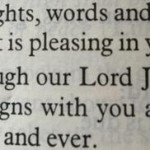
I remember once discussing psalms with a nun and mentioning that one of my favorites was Psalm 19, which begins:
The heavens proclaim the glory of God,
and the firmament shows forth the work of his hands.
Day unto day takes up the story
and night unto night makes known the message.No speech, no word, no voice is heard
yet their span extends through all the earth,
their words to the utmost bounds of the world.There he has placed a tent for the sun;
it comes forth like a bridegroom coming from his tent,
rejoices like a champion to run its course.At the end of the sky is the rising of the sun;
to the furthest end of the sky is its course.
There is nothing concealed from its burning heat.
Her face lit up and she said, “that is one of my favorites, too! I love the imagery of the bridegroom coming from his tent, triumphant after he has consummated his bride to him! It is so rich with meaning for us as church!”
And I blushed and said, “gosh…I hadn’t thought of it that way.” I blushed a lot.
But when I’d thought about it, I realized there was nothing to blush about, and much to rejoice in. Our scriptures sometimes do make us blush a little, because amid all the supernatural instruction, there is humanity exposed in full, as it were. And our savior, having condescended to being human, certainly instructed us that our humanity is acceptable and lovable to God, who hates only our sin, but even so has mercy, and who reaches out to us, trying to get our attention, our focus, in all ways
Here is something I adapted a little from last year; it was born of the moment–50 years into this whole being a Catholic thing–when I finally got the notion of Christ as the Bridegroom:
God yielded to Israel’s obstinacy.
What sort of God is this? A God who yields to a people who do not understand, and who — like spoiled adolescents — tell Him time and time again that they’re not patient enough, not mature enough, just too darned human to put up with doing things His way, which is the way of wisdom?This is remarkable, almost reckless love. This is a love so all-in-all, so unconditional, that it is willing to be not just vulnerable, but by human standards almost foolish in its boundless unconditional reality. Look at the profundity of God’s love for His people, Israel, and for those of us grafted onto their branch. He gives His people something better than a king — something transcendent and eternal and incorruptible. But because they are so body-bound, so captive to their senses and the need to touch, hear, taste and smell, they cannot see what He shows, which is Everything. And so they whine, “well, we want a king, like they have over there,” and God acquiesces.
God takes pity on human limitations and tries another way of teaching and reaching, a better way to know the transcendence. He says, in essence:
My love and my law are not enough? You need a corporeal king? All right then, I will come down and be your corporeal king. I will teach you what I know — that love serves, and that a king is a servant — and I will teach you how to be a servant in order to share in my kingship. In this way, we shall be one — as a husband and wife are one — as nearly as this may be possible between what is Whole and Holy, and what is Broken. For your sake, I will become broken, too, but in a way meant to render you more Whole, and Holy, so that our love may be mutual, complete, constantly renewed, and alive. I love you so much that I will Incarnate, and surrender myself to you. I will enter into you (stubborn, faulty, incomplete you, adored you, the you that can never fully know me or love me back) and I will give you my whole body. I will give you all of myself, unto my very blood, and then it will finally be consummated between us, and you will understand that I have been not just your God, but your lover, your espoused, your bridegroom. Come to me, and let me love you. Be my bride; accept your bridegroom and let the scent and sense of our love course over and through the whole world through the church I beget to you. I am your God; you are my people. I am your bridegroom; you are my bride. This is the great love story, the great intercourse, the great espousal, and you cannot imagine where I mean to take you, if you will only be faithful . . . as I am always faithful.
The rest is here.











